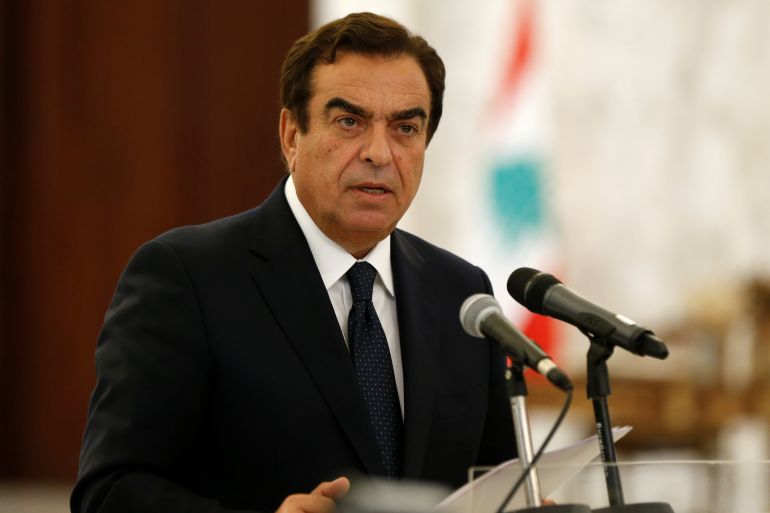Lebanese minister: ‘No question’ of resigning over Saudi crisis
Embattled Lebanese Information Minister George Kordahi says resignation ‘out of the question’ after he questioned the war in Yemen.

Beleaguered Lebanese Information Minister George Kordahi says that resigning is “out of the question” after his remarks on Yemen’s war sparked a diplomatic brouhaha between Beirut and Gulf states.
“My resignation is out of the question,” Kordahi told Lebanese television channel Al-Jadeed on Sunday, without elaborating.
Keep reading
list of 4 itemsArab League ‘concerned’ by ‘deteriorating’ Lebanon-Gulf ties
In Lebanon, petrol is now priced out of reach
Critics walk out as Lebanon parliament reaffirms March 2022 poll
In an interview recorded in August and aired last week, Kordahi said Iran-backed Houthi rebels in Yemen were “defending themselves … against an external aggression”, sparking angry rebukes from Saudi Arabia and its allies and calls for his resignation.
A Saudi Arabia-led military coalition that has included the United Arab Emirates (UAE) and Bahrain intervened to prop up the Yemeni government in 2015, after Houthi rebels seized the capital Sanaa in 2014.
Saudi Arabia on Friday gave Lebanon’s ambassador 48 hours to leave the country, recalled its envoy from Beirut and suspended all imports from Lebanon.
Bahrain and Kuwait quickly followed suit with similar measures and the UAE on Saturday recalled its diplomats from Beirut in “solidarity” with Riyadh.
‘Dominated by Hezbollah’
The Saudi foreign ministry said the moves were made after the “insulting” remarks on the Yemen war, but also because of the influence of Lebanon’s Iran-backed Shia movement Hezbollah.
Kordahi, who was nominated by the Marada Movement, a Christian party allied to Hezbollah, was not a minister at the time of the remarks.
Both Hezbollah and the Marada have rejected calls for his dismissal.
The diplomatic crisis is a new blow to Lebanon, a country in financial and political turmoil where a fragile government is struggling to secure international aid, including from wealthy Arab countries.
On Saturday, Saudi Foreign Minister Prince Faisal bin Farhan told CNBC that Kordahi’s comments “are a symptom of a reality – a reality that the political scene in Lebanon continues to be dominated by Hezbollah”.
“For us, it is broader than just the comments of one minister. It is more an indication of the state that Lebanon is in,” he said.
Oil-rich Gulf states have long channelled funds into Lebanon’s fragile economy. Alarmed by the rising influence of their archrival Iran’s ally Hezbollah in the government, they have become reluctant to ease its financial crisis.